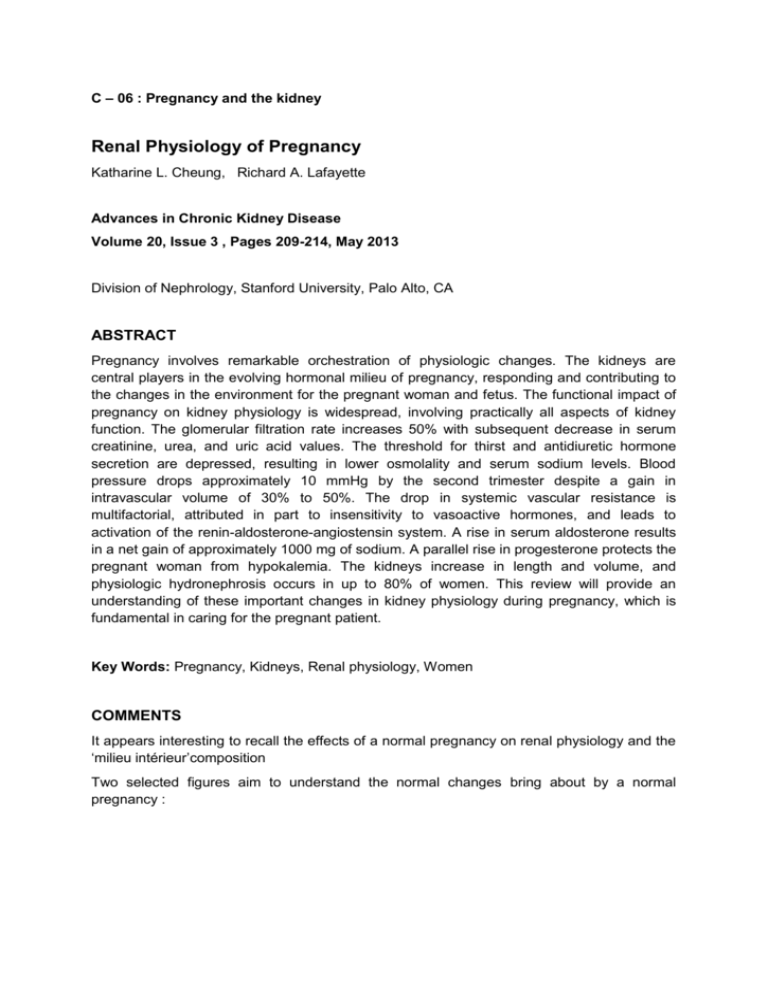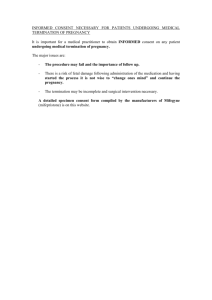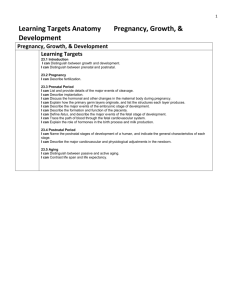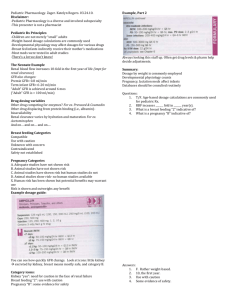DOCX ENG
advertisement

C – 06 : Pregnancy and the kidney Renal Physiology of Pregnancy Katharine L. Cheung, Richard A. Lafayette Advances in Chronic Kidney Disease Volume 20, Issue 3 , Pages 209-214, May 2013 Division of Nephrology, Stanford University, Palo Alto, CA ABSTRACT Pregnancy involves remarkable orchestration of physiologic changes. The kidneys are central players in the evolving hormonal milieu of pregnancy, responding and contributing to the changes in the environment for the pregnant woman and fetus. The functional impact of pregnancy on kidney physiology is widespread, involving practically all aspects of kidney function. The glomerular filtration rate increases 50% with subsequent decrease in serum creatinine, urea, and uric acid values. The threshold for thirst and antidiuretic hormone secretion are depressed, resulting in lower osmolality and serum sodium levels. Blood pressure drops approximately 10 mmHg by the second trimester despite a gain in intravascular volume of 30% to 50%. The drop in systemic vascular resistance is multifactorial, attributed in part to insensitivity to vasoactive hormones, and leads to activation of the renin-aldosterone-angiostensin system. A rise in serum aldosterone results in a net gain of approximately 1000 mg of sodium. A parallel rise in progesterone protects the pregnant woman from hypokalemia. The kidneys increase in length and volume, and physiologic hydronephrosis occurs in up to 80% of women. This review will provide an understanding of these important changes in kidney physiology during pregnancy, which is fundamental in caring for the pregnant patient. Key Words: Pregnancy, Kidneys, Renal physiology, Women COMMENTS It appears interesting to recall the effects of a normal pregnancy on renal physiology and the ‘milieu intérieur’composition Two selected figures aim to understand the normal changes bring about by a normal pregnancy : Figure 1 Hormonal variation throughout pregnancy and early postpartum. Mean data are of plasma human chorionic gonadotropin, estradiol, progesterone, and relaxin levels, before, during, and 6 weeks after pregnancy. Adapted from Ogueh and his colleagues. (Ogueh O, Clough A, Hancock M, Johnson MR. A longitudinal study of the control of renal and uterine hemodynamic changes of pregnancy. Hypertens Pregnancy. 2011;30(3):243–259) Figure 2 Percentage change from baseline of GFR and RPF throughout pregnancy and postpartum. Mean values are measured by inulin or isothalamate and p-aminohippurate clearance for GFR and RPF, respectively, Pregnancy affects essentially all aspects of kidney physiology. The orchestration of changes that occur is a physiologic feat. Kidney and systemic hemodynamics are marked by significant volume expansion and vasodilation. Glomerular filtration rate (GFR) increases 50% and renal plasma flow (RPF) increases up to 80% as compared with nonpregnant levels. Tubular function and handling of water and electrolytes are altered, leading to mild increases in proteinuria, glucosuria, lower serum osmolality, and reductions in serum sodium levels. The kidneys are larger during pregnancy because of fluid retention, and physiologic hydronephrosis is common. Typical laboratory changes depicts sone hemoddilution, including anemia. This article will review important changes in kidney physiology during pregnancy, the understanding of which is fundamental in caring for the pregnant patient. The kidneys face remarkable demands during pregnancy, and it is critical that the practicing nephrologist understands the normal kidney adaptations to pregnancy. GFR rises early to a peak of 40% to 50% that of prepregnancy levels, resulting in lower levels of serum creatinine, urea, and uric acid. There is a net gain of sodium and potassium, but a greater retention of water, with gains of up to 1.6 L. Through effects of progesterone and alterations in RAAS, the systemic vascular resistance falls, leading to lower blood pressure and an increased RPF. The precise orchestration of hemodynamic changes and balance of fluids and electrolytes are essential to the development and maintenance of a successful pregnancy for mother and child. Pr. Jacques CHANARD Professor of Nephrology








![Questionnaire used in the study Demographics GENDER: M [ ] F](http://s3.studylib.net/store/data/006712173_1-21c851410b04058d524e1b79e54e32b0-300x300.png)